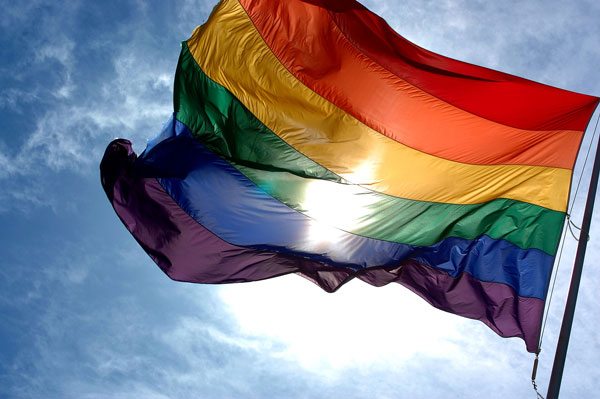
Call it a tipping point. Or yet another rallying cry. But after President Donald Trump tweeted yesterday that transgender service members were no longer accepted or allowed in the U.S military, the widening movement to show that #Transrightsarehumanrights caught fire.
The unilateral decision from the Commander-in-Chief caught Congress, the Pentagon, and Defense Secretary James Mattis off guard, among others, and was justified by Trump as necessary to cut costs and keep the military focused on victory, according to the New York Times:
It reverses the gradual transformation of the military under President Barack Obama, whose administration announced last year that transgender people could serve openly in the military. Mr. Obama’s defense secretary, Ashton B. Carter, also opened all combat roles to women and appointed the first openly gay Army secretary.
The shift was announced with such haste that the White House could not answer basic inquiries about how it would be implemented. Chief among those questions was what would happen to the thousands of openly transgender people currently serving on active duty.
Human rights organizations quickly responded with rallies, petitions, and urgent calls to action. The Human Rights Campaign called Trump’s pronouncement an “all-out assault on service members” and the American Civil Liberties Union (ACLU) labeled it as “cruel and dangerous.”
HRC President Chad Griffin said in a press release,
Today Donald Trump has proven himself as unpatriotic as he is unfit to serve as Commander in Chief. He has put a target on the backs of the more than 15,000 transgender troops proudly serving in our military. This heinous and disgusting action endangers the lives of American service members, undermines military readiness and makes our country less safe. It is also the latest effort by Trump and Mike Pence to undo our progress and drag LGBTQ people back into the closet by using our lives as political pawns.
“Political pawns” is the right descriptor; some evidence shows that the move was a deliberate effort to make Democrats in Rust Belt states, which are traditionally more socially conservative, take a position on this divisive issue. (Not to mention it distracts from Russia investigations, health bill debates, and lots of other controversial fights in Washington.) Axios quoted a Trump official saying,
This forces Democrats in Rust Belt states like Ohio, Michigan, and Wisconsin, to take complete ownership of this issue. How will the blue collar voters in these states respond when senators up for re-election in 2018 like Debbie Stabenow are forced to make their opposition to this a key plank of their campaigns?
The use of a particularly vulnerable marginalized population as a political football, particularly when they have offered their lives in service of their country, is almost too disgusting for words.
Sign up for our free newsletters
Subscribe to NPQ's newsletters to have our top stories delivered directly to your inbox.
By signing up, you agree to our privacy policy and terms of use, and to receive messages from NPQ and our partners.
The National Center for Transgender Equality (NCTE) had similarly harsh words for the Trump administration and sounded a warning bell about the rollback of workplace protections for LGTBQ citizens. NCTE Director of Policy Jean Tobin said in a statement,
Not only did President Trump promise today to kick out 15,000 transgender military service members who are honorably serving their country, but the Department of Justice is now also about to go into federal court saying transgender people across the country can be fired, evicted, and denied health care because of who they are. This is not only gratuitous and cruel, but it is also contrary to two decades of case law.
Although Trump appeased conservatives by ending an ongoing debate on Capitol Hill over whether the Pentagon should cover gender transition costs for troops, his argument had some holes: the Washington Post did the math and found that the military spends five times as much on Viagra as it would on transgender troops’ transition-related medical care.
“Considering the prevalence of transgender service members among the active duty military and the typical health-care costs for gender-transition-related medical treatment, the Rand study estimated that these treatments would cost the military between $2.4 million and $8.4 million annually,” Post writer Christopher Ingraham notes. “By contrast, total military spending on erectile dysfunction medicines amounts to $84 million annually, according to an analysis by the Military Times—ten times the cost of annual transition-related medical care for active duty transgender service members. GQ noted that Trump’s trips to Mar-a-Lago just this year so far have cost far more than the projected costs of transition-related healthcare.
The same RAND study found that “The limited research on the effects of foreign military policies [allowing transgender service members] indicates little or no impact on unit cohesion, operational effectiveness, or readiness. Commanders noted that the policies had benefits for all service members by creating a more inclusive and diverse force.”
Many Republicans disagreed with Trump’s latest policy change, according to FiveThirtyEight, including Trump’s latest nemesis, Alaska Senator Lisa Murkowski, and Washington’s own war hero, Senator John McCain.
“Senator John McCain, Republican of Arizona, condemned Mr. Trump’s sudden announcement, saying it muddied policy and that anyone who is fit to serve should be allowed to do so,” the New York Times reported. McCain told USA Today that this “is yet another example of why major policy announcements should not be made via Twitter.”
Back on the ground, organizations like Third Wave Fund are trying to convert rage into resistance. A “Flush Transphobia Fund” that supports grassroots response to anti-trans legislation was nearly halfway to its $5,000 goal, and the ACLU invited trans people serving in the military to “contact us if you want to explore your options.”
Despite the enormity of the latest challenge, as NPQ writer Mary Frances Mitchner recently noted, the community is more than prepared:
“In this case, anyone of the social justice, progressive, liberal, libertarian or Democratic Party persuasion who needs a brief hiatus from the front lines might find that the LGBTQ rights and equal rights communities are in place to take up the lead… For the 2018 election cycle, the LGBTQ community is woke and poised to play. Collectively, they have used their voices and partners to make appreciable dents in barriers to full and equal rights, even knocking some down.”—Anna Berry













